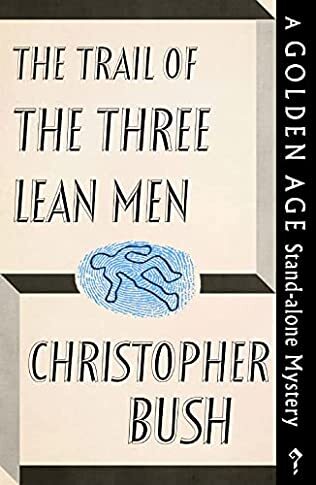The Trail Of The Three Lean Men

A review of The Trail of the Three Lean Men by Christopher Bush
By the time The Trail of The Three Lean Men was published in 1932, Christopher Bush had given up his full-time employment as a teacher to concentrate on his developing writing career. This book is one of the rarest of his books, not helped by the fact that he chose to publish under the nom de plume of Noel Barclay, and it has been rescued from obscurity by Dean Street Press, for which they are to be congratulated. It may be that Bush did not want to distract from his now established brand of Ludovic Travers’ murder mysteries.
This is altogether a different book, more of an adventure story or a thriller in the John Buchan mould, albeit without the jingoism, or à la Eric Ambler without the finesse and psychological tautness. It is an engaging enough tale and there is more than enough to keep the reader entertained but it does not hit the heights of the masters of the genre.
Part of the problem, I think, is that it is narrated in the first person. Our guide is Don Temple, a man down on his luck who is lured, partly against his will and his better judgment, into a foreign caper with a gang in the imaginary European country of Levasque. In a thriller the reader can expect that the protagonists will experience moments of danger when their lives are in peril. Having your lead character recount the tale after the event takes away a lot of the dramatic tension as the reader can only assume that their narrator has survived their ordeal.
Short of funds Temple visits a newspaper friend of his in an attempt to secure a position. Their conversation turns to the legendary journalist, Tom Varlow, who has disappeared but who could make a story out of any seemingly random event. Looking out of the window, they see three lean men of various heights walking down the street and Temple accepts the challenge to follow them and write a story about them. Some dropped travel documents tell him that the motley crew of Prargent, Spider, Marcel together with their boss, Gimbolt whose real is revealed as Larkin, and a mysterious Mr Lewis are going to Levasque and he duly follows them.
The gang become suspicious of his attentions, not unsurprisingly, for which he earns a blow on the head and given an ultimatum to join them. Despite not knowing precisely what their game is, Temple agrees and masquerades as Prargent’s valet. The gang’s mission is to assassinate the dastardly Destordi who assassinated Larkin’s father in the States and has fled to Levasque where there is no extradition treaty.
During his time in Levasque, Temple witnesses a murder and an assassination attempt, for which he is arrested, frequents the Café Granard where he meets the enigmatic Feuermann, who is employed by Destordi, and an English chanteuse, Lucy, with whom, inevitably, he falls in love. Destordi is holed up in a well-protected house and after the gang’s original plan, suggested by Temple, of campaigning for a change in extradition laws fails spectacularly, they have to resort to more direct methods.
They employ an ingenious method to break into the house, and there is a shootout, increasing the body count by another four, Lucy, who had been held hostage, is rescued, and the true identity of Feuermann is revealed. There is an element of “and they all lived happily after” to the ending as Temple makes his fortune, and gets his girl, by which time the journalistic side of the tale has long been forgotten.
The book had its moments and was written with some verve, but Bush has written far better, and I got the sense that this was something he wanted to get out of his system. One for the completist.



